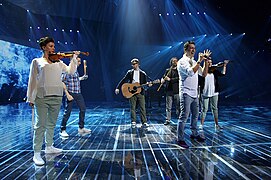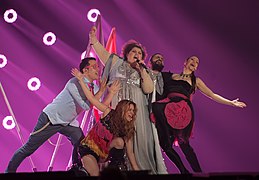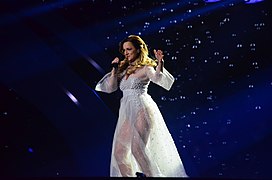
The participation of Serbia in the Junior Eurovision Song Contest first began in Bucharest, Romania at the Junior Eurovision Song Contest 2006, having previously participated in 2005 as part of Serbia and Montenegro. Radio Television of Serbia (RTS) a member organisation of the European Broadcasting Union (EBU) are responsible for the selection process of its entrants. Serbia used the national selection format broadcasting a show entitled Izbor za dečju pesmu Evrovizije for its participation at the contests between 2006 and 2010.
Serbia participated in the Eurovision Song Contest 2013 with the song "Ljubav je svuda" written by Saša Milošević Mare and Marina Tucaković. The song was performed by Moje 3, which among its members included Nevena Božović who had previously represented Serbia in the Junior Eurovision Song Contest in 2007 where she placed third with the song "Piši mi". The Serbian national broadcaster, Radio Television of Serbia (RTS) organised the national final Beosong 2013 in order to select the Serbian entry for the 2013 contest in Malmö, Sweden. The national final consisted of two shows: a semi-final and a final on 2 and 3 March 2013, respectively. Fifteen entries competed in the semi-final where a public televote selected the top five to qualify to the final. The five qualifiers competed in the final which resulted in "Ljubav je svuda" performed by Moje 3 as the winner entirely by a public televote.
Serbia participated in the Eurovision Song Contest 2015 with the song "Beauty Never Lies" written by Vladimir Graić and Charlie Mason. The song was performed by Bojana Stamenov. The Serbian national broadcaster, Radio Television of Serbia (RTS) organised the national final Odbrojavanje za Beč in order to select the Serbian entry for the 2015 contest in Vienna, Austria. Vladimir Graić was selected to compose three songs for the national final which consisted of two shows on 14 and 15 February 2015. Two of the songs were performed by established artists, while one was performed by an undiscovered candidate selected through a scouting process. The second show resulted in "Ceo svet je moj" performed by Bojana Stamenov as the winner following the combination of votes from a three-member jury panel and a public televote. The song was later translated from Serbian to English for the Eurovision Song Contest and was titled "Beauty Never Lies".
Serbia participated in the Eurovision Song Contest 2016 with the song "Goodbye (Shelter)" written by Ivana Peters. The song was performed by Sanja Vučić Zaa, who was internally selected by the Serbian national broadcaster, Radio Television of Serbia (RTS) to represent Serbia in the 2016 contest in Stockholm, Sweden. Vučić was announced as the Serbian representative on 5 March 2016, while the song, "Goodbye (Shelter)", was presented on 12 March 2016 during a show titled Pesma Srbije za Evropu.
Serbia participated in the Eurovision Song Contest 2017 with the song "In Too Deep" written by Borislav Milanov, Joacim Bo Persson, Johan Alkenäs and Lisa Desmond. The song was performed by Tijana Bogićević, who was internally selected by the Serbian national broadcaster, Radio Television of Serbia (RTS) to represent Serbia in the 2017 contest in Kyiv, Ukraine. Bogićević was announced as the Serbian representative on 27 February 2017, while the song, "In Too Deep", was presented on 11 March 2017.
Serbia participated in the Eurovision Song Contest 2018 with the song "Nova deca" written by Sanja Ilić, Tanja Ilić and Danica Krstić. The song was performed by Sanja Ilić and the group Balkanika. The Serbian national broadcaster, Radio Television of Serbia (RTS) organised the national final Beovizija 2018 in order to select the Serbian entry for the 2018 contest in Lisbon, Portugal. Seventeen entries competed in the national final on 20 February 2018, which resulted in "Nova deca" performed by Sanja Ilić and Balkanika as the winner following the combination of votes from a five-member jury panel and a public televote.
Serbia participated in the Eurovision Song Contest 2019 with the song "Kruna" written and performed by Nevena Božović who had previously represented Serbia in the Junior Eurovision Song Contest in 2007 and in the Eurovision Song Contest in 2013 as part of the group Moje 3. The Serbian national broadcaster, Radio Television of Serbia (RTS) organised the national final Beovizija2019 in order to select the Serbian entry for the 2019 contest in Tel Aviv, Israel. The national final consisted of three shows: two semi-finals on 27 and 28 February 2019 and a final on 3 March 2019. Twelve entries competed in each semi-final where the top six qualified to the final from each semi-final following the combination of votes from a five-member jury panel and a public televote. The twelve qualifiers competed in the final which resulted in "Kruna" performed by Nevena Božović as the winner following the combination of votes from a five-member jury panel and a public televote.
Serbia originally planned to participate in the Eurovision Song Contest 2020 with the song "Hasta la vista" written by Nemanja Antonić, Kosana Stojić and Sanja Vučić. The song was performed by the group Hurricane, which among its members included Sanja Vučić who had previously represented Serbia in the Eurovision Song Contest in 2016 where she placed eighteenth with the song "Goodbye (Shelter)". The Serbian national broadcaster, Radio Television of Serbia (RTS) organised the national final Beovizija 2020 in order to select the Serbian entry for the 2020 contest in Rotterdam, Netherlands. The national final consisted of three shows: two semi-finals on 28 and 29 February 2020 and a final on 1 March 2020. Twelve entries competed in each semi-final where the top six qualified to the final from each semi-final following the combination of votes from a five-member jury panel and a public televote. The twelve qualifiers competed in the final which resulted in "Hasta la vista" performed by Hurricane as the winner following the combination of votes from a five-member jury panel and a public televote.
Serbia participated in the Eurovision Song Contest 2021 with the song "Loco loco" written by Nemanja Antonić, Sanja Vučić and Darko Dimitrov. The song was performed by the group Hurricane, which were internally selected by the Serbian national broadcaster, Radio Television of Serbia (RTS) to represent Serbia in the 2021 contest in Rotterdam, Netherlands. Among the members of the group included Sanja Vučić who had previously represented Serbia in the Eurovision Song Contest in 2016 where she placed eighteenth with the song "Goodbye (Shelter)". Hurricane was announced as the Serbian representative on 17 December 2020 after they were due to compete in the 2020 contest with "Hasta la vista" before the event's cancellation, while the song, "Loco loco", was presented on 5 March 2021.
Serbia participated in the Eurovision Song Contest 2022 in Turin, Italy, with "In corpore sano" performed by Konstrakta. The Serbian national broadcaster Radio Television of Serbia (RTS) organised the national final Pesma za Evroviziju '22 in order to select the Serbian entry for the 2022 contest. It was the first entry in the Eurovision Song Contest to contain a verse in Latin.
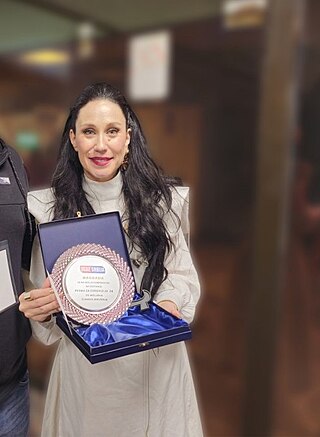
Ana Đurić, known professionally as Konstrakta, is a Serbian singer and songwriter. She had risen to prominence as the lead vocalist of the indie pop band Zemlja gruva!, which was founded in 2007, before pursuing her solo career in 2019. She gained more significant recognition by representing Serbia in the Eurovision Song Contest 2022 with the song "In corpore sano", finishing in fifth place.
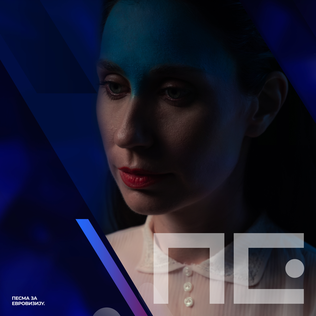
"In corpore sano" is a single by Serbian singer-songwriter Konstrakta. It was released on 11 February 2022 through PGP-RTS as part of her three-song project Triptih. It was written by the artist alongside Milovan Bošković. The song represented Serbia in the Eurovision Song Contest 2022 in Turin, Italy, after winning Pesma za Evroviziju '22, Serbia's national final. In the final of the contest, it placed fifth and broke Serbia's record for the most points received.
Serbia participated in the Eurovision Song Contest 2023 in Liverpool, United Kingdom, with "Samo mi se spava" performed by Luke Black. The Serbian national broadcaster, Radio Television of Serbia (RTS), organised the national final Pesma za Evroviziju '23 in order to select the Serbian entry for the 2023 contest. The final took place on 4 March 2023, with a combination of jury voting and televoting selecting Black to represent Serbia at the 2023 contest in Liverpool.
Pesma za Evroviziju is a Serbian song contest organized by Radio Television of Serbia (RTS) in collaboration with SkyMusic. Since its inception in 2022, it has been used to select the Serbian entry for the Eurovision Song Contest.
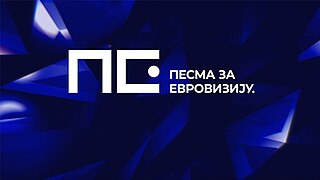
Pesma za Evroviziju'22 was the first edition of Pesma za Evroviziju, Serbia's national final organised by Radio Television of Serbia (RTS) to select the Serbian entry for the Eurovision Song Contest 2022. The selection consisted of two semi-finals held on 3 and 4 March 2022, respectively, and a final on 5 March 2022. All shows were hosted by Dragana Kosjerina and Jovan Radomir with backstage interviews conducted by Kristina Radenković and Stefan Popović. The three shows were broadcast on RTS1 and RTS Planeta as well as streamed online via the broadcaster's website rts.rs.

Pesma za Evroviziju'23 was the second edition of Pesma za Evroviziju, Serbia's national final organised by Radio Television of Serbia (RTS) to select the Serbian entry for the Eurovision Song Contest 2023. The selection consisted of two semi-finals held on 1 and 2 March 2023, respectively, and a final on 4 March 2023. All shows were hosted by Milan Marić and Dragana Kosjerina with backstage interviews conducted by Kristina Radenković and Stefan Popović. The three shows were broadcast on RTS1, RTS Svet and RTS Planeta as well as streamed online via the broadcaster's website rts.rs and the broadcaster's Eurovision dedicated Youtube channel.
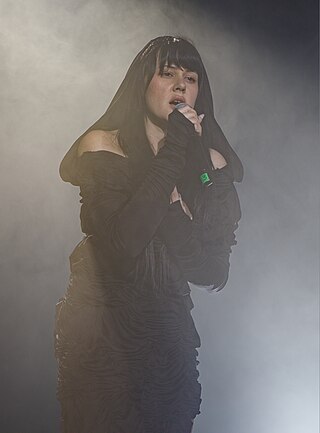
Teodora Pavlovska, known professionally as Teya Dora, is a Serbian singer, songwriter, and producer. Born in Bor, she debuted in 2018 and rose to popularity with the 2023 single "Džanum", which went internationally viral on TikTok.
Serbia participated in the Eurovision Song Contest 2024 in Malmö, Sweden, with "Ramonda" performed by Teya Dora. The Serbian national broadcaster, Radio Television of Serbia (RTS), organised the national final Pesma za Evroviziju '24 in order to select the Serbian entry for the contest.

Pesma za Evroviziju'24 was the third edition of Pesma za Evroviziju, the national final organised by Radio Television of Serbia (RTS) to select the Serbian entry for the Eurovision Song Contest 2024. The selection consisted of two semi-finals held on 27 and 29 February 2024, respectively, and a final on 2 March 2024, all presented by Dragana Kosjerina and Slaven Došlo.

Filip Baloš is a Serbian singer and songwriter.






